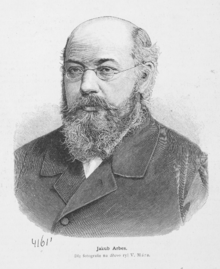Jakub Arbes

Jakub Arbes (June 12, 1840, Prague (Smíchov) – April 8, 1914) was an influential Czech revolutionary, intellectual and writer. He is best known as the creator of the literary genre called romanetto and spent much of his professional life in France.
Life and Politics
A native of Smichov in Prague, Arbes excelled as student, gaining tutorship under Jan Neruda, with whom he harboured a lifelong admiration. Later he studied Philosophy and Literature at Prague Polytechnic and in 1867 began his career in journalism as editor of Vesna Kutnohorská, and from 1868 to 1877 as the chief editor of the National Press. Arbes was also an editor of the seminal and often polemical magazines 'Hlas' (The Voice) and 'Politiks' (Politics), and a sympathizer of the Májovci literary group. During this time Arbes was persecuted and spent 15 months in the Czech Lipa prison, for leading an outspoken and humanitarian opposition to the ruling Austro-Hungarian Empire .[1] He left Prague soon after, whereupon he was drawn to Paris and the South of France to be part of the ever rapidly expanding intellectual community there. Living in France he became close friends with other "Bohemian Parisiens" such as Paul Alexis, Luděk Marold, Guy de Maupassant, Viktor Oliva, and Karel Vítězslav Mašek as well as the great French writer Émile François Zola.
Writer
Arbes cooperated with many of his contemporaries, Jiří Karásek ze Lvovic, Josef Svatopluk Machar and his mentor Jan Neruda, and was greatly influenced by the British writers Lord Byron and Edgar Allan Poe. He translated much of Poe's literature into French and Czech, and his affection for Poe was so great that he named his son Edgar, who was raised in his adopted France. Perhaps Arbes' greatest influence came from Émile Zola's theory of the experimental novel. Arbes wrote fiction in which he analysed the plight of the urban working classes and explained the ideas of utopian socialism. Arbes's work is characterised by a sense of moral justice and rationalist, critical thinking. His most important works are his "romanettoes", written in the 1860s and the 1870s. These short novels are predecessors of the modern detective story. They are firmly set within concrete locations, mostly in Central Europe, and they usually present a gothic mystery, which is subsequently resolved through intellectual effort and rational analysis. Arbes's "romanettoes" introduced technical knowledge and scientific reasoning into modern literature. Arbes used autobiographical elements and anarchic and free-thinking themes in his novels. He was fascinated by creative individuals and political rebels whose intellectual capacities gave them personal independence, but whose non-conformism led them to destruction.[2]
Newton's Brain
Among Arbes's most influential works was 'Newton's brain' (1877). In this story, two ideas coincide: the brain of the genius and trickster, apparently dies at the battle of Koniggratz in the Austro-Prussian war of 1866. It turns out however, that he has not died and instead is able to procure a replacement for his injured brain. This replacement is none other than Newton's brain. From now on, he understands the laws of nature and learns how to evade them. The contraption that helps him overcome time and space is some strange apparatus, possibly only a geometrical design -a kind of triangle-, with which one can travel faster than the speed of light. It also enables one to photograph the past. The device is not explicitly a time machine, but is rather an indeterminate thing between the material and the mental. For in the end, the narrator's friend discloses to his baffled audience that this device is nothing but human imagination. And yet, it is not only that, for the triangle faster than light is very precise instrument and it is claimed that with its help one can reconstruct the truth of history, in this case the Battle of Koniggratz. 'Newton's brain' appeared some 18 years before H.G. Wells Time Machine, and has been described as Wells' most poignant influence. Zola wrote of Arbes: 'Like Wells, Arbes is not a poet, not an artist, but rather a writer, and one of considerable stature, by which I mean an intellectual experimenter, a mind of a certain intellectual partiality and from a specific social background, an author with a socially critical and ameliorative tendency, and an educator rather than a discoverer in spheres of soul and form" [3]
Legacy
Arbes' legacy has given him great prominence in Czech culture and modern literature globally, inspiring generations of writers, intellectuals and students. The public square in central Prague is named in his honour as well as several other squares and streets in Czech cities.
Works
Romanettos
- Ďábel na skřipci (1865)
- Elegie o černých očích (1865–1867)
- Svatý Xaverius (1873)
- Sivooký démon (1873)
- Zázračná madona (1875)
- Ukřižovaná (1876)
- Newtonův mozek “Newton’s Brain” (1877)
- Akrobati (1878)
- Zborcené harfy tón (1885–1886)
- Lotr Gólo (1886)
- Duhový bod nad hlavou (1889)
- Duhokřídlá Psýché (1891)
- Kandidáti existence
- Etiopská lilie
Novels
- Moderní upíři
- Štrajchpudlíci
- Mesiáš
- Anděl míru
- Kandidáti existence
- Český Paganini
- Záhadné povahy
- Z duševní dílny básníků
Journalism
- Epizody
- Pláč koruny české neboli Nová persekuce
See also
References
- ↑ ed. Věra Menclová, Václav Vaněk (2005). Slovník českých spisovatelů (in Czech). Prague: Libri. p. 52. ISBN 80-7277-179-5.
- ↑ http://www.arts.gla.ac.uk/Slavonic/Cz_novel.html''.
- ↑ http://books.google.com.au/books?id=2W-QMbKoHMoC&pg=PA169&lpg=PA169&dq=jakub+arbes+wells&source=bl&ots=wwdjr01r6B&sig=ZzPvYp8b5-hpX-x56ijEUZCpcdw&hl=en&sa=X&ei=Zk1UT7HABPC5iAeW2aX_BA&ved=0CCYQ6AEwAA#v=onepage&q=jakub%20arbes%20wells&f=falsel''.
External links
| Wikimedia Commons has media related to Jakub Arbes. |
|